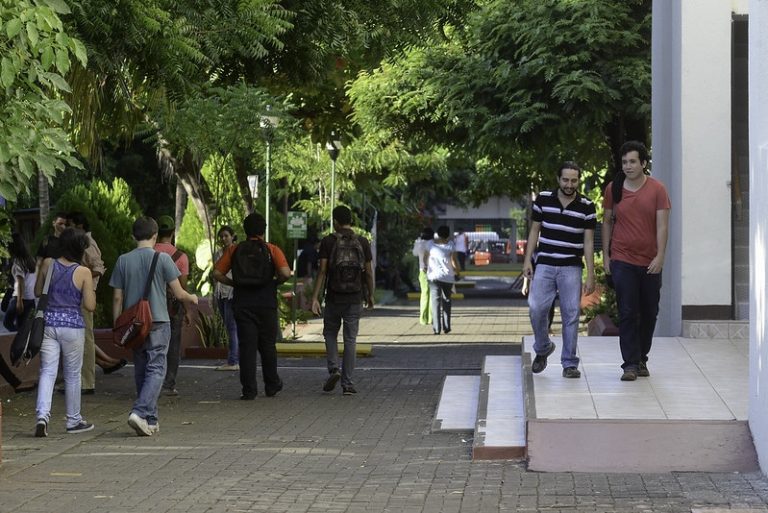8 de noviembre 2021

Children of Exile: The Births “Sowing Hope” in the Camp of Nicaraguan Farmers

PUBLICIDAD 1M
PUBLICIDAD 4D
PUBLICIDAD 5D
Four young Nicaraguans tell Confidencial they don’t identify with any political party, and reject the age-old practice of pacts and strongman figures.

Young people in Nicaragua do not feel represented by any political party. Photo: Archive / Confidencial.
“No, none of the political parties represents me. None of them represents my interests,” states Adela Espinoza, 25. “They don’t represent any national interests,” adds Ricardo Zeas, 24. Meanwhile, “Pedro”, 23 years old, asserts: “They’re not offering us anything different, just more of the same. “They don’t address the youths’ principle demands,” notes Winsthon Noguera, who’s just 21.
Confidencial conversed with these four young people about national politics, the upcoming presidential elections, and the direction the country is going in. Adela, Ricardo, Wisthon and Pedro, the latter an assumed name, are four young people who have never exercised the democratic right to vote. In 2016, when they had their first opportunity to vote in a general election, they didn’t see any political alternatives.
“There was only one figure to vote for, one who everyone said ‘was going to win’. That’s the current government party,” Adela recounts. At that time, she was 19.
Winsthon Noguera adds that in 2016, “there weren’t many options or political alternatives to vote for.”
Ricardo Zeas didn’t participate in the elections that year. “All of us students in the Law Department of Nicaragua’s National Polytechnic University decided not to participate in the electoral fraud.”
The political culture of strongman figures, plus the constant pacts and electoral frauds, are the main reasons young people reject politics and elections in Nicaragua.
“All the politicians are corrupt,” responds Adela when asked why she doesn’t participate politically. “The politicians have plundered this country.”
Winsthon Noguera feels similarly. “The pacts, the way that big capital negotiates and reaches consensus with the Ortega-Murillo regime” are the principal factors that discourage the youth from participating in politics.
The parties’ and the government’s lack of interest in resolving the population’s real problems is another reason behind the youth’s negative response. “In this country, we have the problems of corruption and a lack of human rights. However, there are also problems due to climate change, problems in employment, in the economy, and all those topics aren’t being brought up,” Pedro states.
The youth would like to see a deep change in the country’s political life, one that embraces inclusion and democracy.
“The political party that all Nicaraguans need is one of inclusion,” Ricardo affirms when asked what changes he’d like to see in national politics.
“First, those people who already have been in politics for years should retire and make way for the new generations,” Pedro believes.
Winsthon agrees with both of them. In addition, he wants to see “the active participation of the youth being promoted”, and “having the government consult their plans with the youth.”
Despite the demand of the Nicaraguan youth for a political change in the country, “that seems distant”. They all affirm that the electoral process set to culminate this Sunday won’t be “democratic” either.
“This November 7, when we should be celebrating democratic elections, we’re merely holding some voting. This election doesn’t have the necessary conditions to be legitimate,” Winsthon comments.
“I don’t even know who the other candidates are. I don’t know what they’re proposing, and I don’t feel involved in what they do, or what they say they’re going to do,” Pedro adds.
He also says he feels “worried” about what will happen in Nicaragua in the next months. He assures that the young people “have all their roads blocked.”
“We have only two options: We stay here [in Nicaragua] with some insecure job, or we leave the country,” Pedro laments.
“Mostly, what I feel is frustration, because we can’t do anything,” Ricardo Zeas concludes.
This article was originally published in Spanish on our website. It has been translated into English by Havana Times
PUBLICIDAD 3M
Confidencial es un diario digital nicaragüense, de formato multimedia, fundado por Carlos F. Chamorro en junio de 1996. Inició como un semanario impreso y hoy es un medio de referencia regional con información, análisis, entrevistas, perfiles, reportajes e investigaciones sobre Nicaragua, informando desde el exilio por la persecución política de la dictadura de Daniel Ortega y Rosario Murillo.
PUBLICIDAD 3D